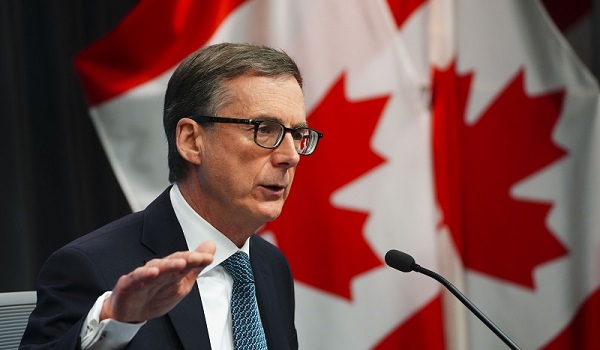Bank of Canada worries unemployment rate may delay consumer rebound
Bank of Canada officials are increasingly worried that a weaker jobs market may delay a recovery in consumer spending, a concern that encouraged them to cut interest rates last month.
The bank’s six-member governing council spent “considerable time” talking about the state of the labor market when they last set interest rates, according to a summary of the deliberations released Wednesday.
Some officials expressed concern that a further deterioration in the country’s job market had the potential to dampen consumption and put downward pressure on growth and inflation.
Ultimately, they decided to cut interest rates for a second consecutive meeting, bringing the policy rate to 4.50 per cent on July 24.
Combined with officials’ views that the country’s economy is in excess supply and price pressures are more subdued, the focus on a weakening jobs market confirms the bank has started to consider setting policy in a way that reduces chances of undershooting the 2 per cent inflation target.
According to the minutes, officials “agreed they now needed to be as focused on the downside risks as the upside risks,” and that they needed to “put more emphasis on the symmetric nature” of the target.
It’s a marked change that shows the bank is giving less attention to fears about reigniting inflation and more to keeping interest rates too high for too long and causing unnecessary economic damage.
There was “clear consensus” among officials that it would be “appropriate” to expect more rate cuts if disinflation continued, echoing Governor Tiff Macklem’s opening remarks to reporters at the July meeting. Policymakers also agreed they are not on a predetermined rate path and will take decisions one meeting at a time.
“While restrictive monetary policy was still required to address remaining price pressures, it should not be as restrictive,” officials said.
Officials said core inflation measures have “eased meaningfully” since April and price pressures have become “less broad-based.”
Canada’s unemployment rate rose to 6.4 per cent in June and has risen 1.4 percentage points since January 2023. It’s harder for young Canadians and newcomers to find work, policymakers said, and the number of job vacancies has fallen to more normal levels.
The bank’s consumer and business surveys also show labor pressures easing, officials said — pessimism among workers about their employment prospects is rising as firms say they’re facing fewer shortages.
And while they flagged that wage growth remains elevated, officials say they expect it to moderate given the slack they’re seeing in the jobs market.
Last week, weaker employment data in the US sparked a selloff in global equities as bonds rallied amid increased bets the Federal Reserve will be forced to cut borrowing costs more deeply and quickly than was previously expected. Yields on government of Canada notes also fell, and traders in overnight swaps are pricing about 100 basis points of easing from the Bank of Canada by March 2025.
Economists at the Bank of Montreal and Canadian Imperial Bank of Commerce also shifted their calls and many now expect Canada’s central bank to ease monetary policy at its September, October and December meetings.
This article was first reported by BBN Bloomberg













